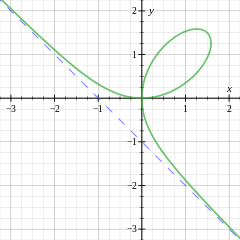Cubic Factorization Over Complex Numbers!

Find the sum of all integers and such that the cubic above factors over the complex numbers.
Image Credit: Wikimedia Georg-Johann .
The answer is 9.
This section requires Javascript.
You are seeing this because something didn't load right. We suggest you, (a) try
refreshing the page, (b) enabling javascript if it is disabled on your browser and,
finally, (c)
loading the
non-javascript version of this page
. We're sorry about the hassle.
If the cubic is to factor in Complex [ x ; y ], then one of the factors must be linear. Without loss of generality, we may assume this factor is of the form x − p y − q where p and q are complex numbers.
Substituting x = p y + q in the original cubic, we get a polynomial in y that must be identically 0 . Thus each of its coefficients must be 0 . This gives us the four equations:
1 + p + p 3 = 0 4 + 2 p + 3 p 2 + q + 3 p 2 q = 0 3 + A q + 3 q 2 + q 3 = 0 B + A p + 2 q + 6 p q + 3 p q 2 = 0
Solving these equations simultaneously, yields A = 4 and B = 5 .
As a check we note that the resulting polynomial can be written as ( x + y + 2 ) ( y + 1 ) 2 + ( x + 1 ) 3 . The reducibility of this polynomial will not change if we let x = X − 1 and y = Y − 1 . This produces the polynomial X 3 + X Y 2 + Y 3 . Letting z = X / Y shows that this polynomial factors over Complex [ x ; y ], since z 3 + z + 1 factors over Complex [ z ].